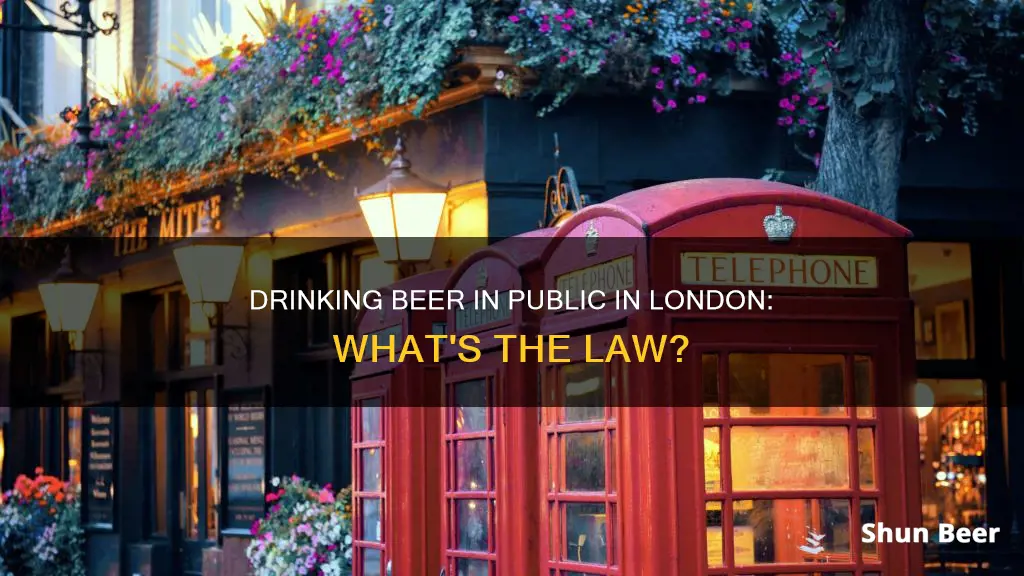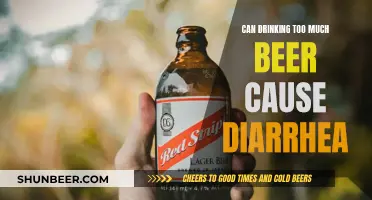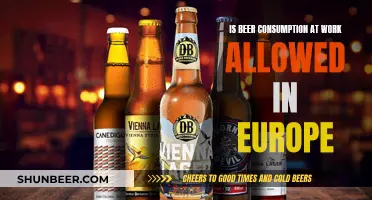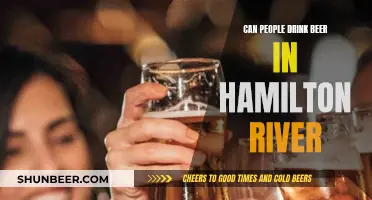
Drinking in public is a nuanced topic in London, with no general prohibition on drinking in the street. However, there are specific laws and rules that govern alcohol consumption in public spaces. In London, it is unlawful to consume alcohol on public transport, including the London Underground, DLR, and buses. While this law is sometimes ignored, individuals can be fined if caught by an official. Additionally, local councils have the authority to implement measures to prevent drinking in certain areas associated with anti-social behaviour, and the police can confiscate alcohol and issue fines or arrests for non-compliance. It is also worth noting that being drunk in public and causing a disturbance is an offence. These rules vary across different areas of London, and individuals are advised to look out for local signage prohibiting public drinking.
What You'll Learn

Drinking in public in London: is it legal?
There is no general ban on drinking alcohol in public in London. However, drinking in public is illegal in many places in the UK, and local laws vary. In London, it is illegal to drink alcohol on public transport, including the London Underground, DLR, and buses. It is also illegal to be drunk and disorderly in a public place or on any highway or other public place.
In London, as in the rest of the UK, councils can ban drinking in public in certain areas. For example, Croydon Council in London is expected to introduce a ban on drinking in public in Thornton Heath after long-standing complaints of people getting drunk and causing a nuisance in the street. This ban will be enforced through a Public Space Protection Order (PSPO), which gives the police more power to confiscate alcohol and issue fines.
If you are caught drinking in a public place where it is banned or fail to comply with a police officer's request, you may be fined or arrested. PSPOs give police officers the power to order individuals to stop drinking and confiscate their alcohol.
Underage drinking in public is also illegal across the UK. Police can confiscate alcohol from under-18s, issue fines, or make arrests.
Breast Cancer and Beer: Is It Safe to Drink?
You may want to see also

Drinking on London public transport
Drinking alcohol in public in London is a complicated issue. While there are no blanket restrictions against drinking in public in the UK, local councils can implement measures to restrict drinking in certain areas. These measures are typically put in place to prevent anti-social behaviour. In London, this means that drinking alcohol in public transport is generally not allowed.
Transport for London (TfL) has banned the consumption of alcohol on the London Underground, Tube, buses, trams, Docklands Light Railway, tram services, and stations. This ban includes carrying open containers of alcohol, and it has been in place for over a decade. The ban was implemented by former London mayor Boris Johnson, who stated that it was necessary to improve the safety and security of public transport in the city.
However, it is important to note that carrying alcohol in closed containers is permitted on London's public transport. Additionally, some boroughs have included London Underground stations in their 'No Drinking Zones', making it an offence to have an open container of alcohol in these areas.
While the consumption of alcohol on London's public transport is banned, drinking alcohol is allowed on most trains in England and Wales. Train operators, however, may opt to run 'dry' trains, particularly for sporting events, where passengers cannot bring or consume alcohol on board. In such cases, notices are usually put up in advance to inform passengers of the temporary regulation.
It is also worth noting that drinking alcohol in public can lead to fines or even arrest, especially if it is associated with anti-social behaviour or failure to comply with requests from the police or council authorities.
Beer and College Football: A Match Made in Heaven?
You may want to see also

Drinking bans in London
In London, there is no general ban on drinking alcohol in public spaces. However, drinking in public is banned in certain areas. Local councils can implement measures to prevent drinking in specific locations where alcohol is believed to contribute to anti-social behaviour. These measures are known as Public Spaces Protection Orders (PSPO). PSPOs give the police the authority to confiscate alcohol and issue fines.
Thornton Heath in Croydon, South London, is an example of an area with a PSPO in place. The Croydon Council introduced the PSPO in response to long-standing complaints about individuals getting drunk and causing a nuisance in the street. The order gives the police additional powers to confiscate open containers of alcohol. Sam Khasanov, a local restaurant manager, expressed support for the PSPO, stating that the presence of drunk individuals in the area has degraded the neighbourhood and discouraged families from visiting.
Drinking alcohol in public is prohibited on London's public transport, including Transport for London (TfL) services such as buses, trams, tubes, and the Docklands Light Railway. Consuming alcohol on Scotrail train services in Scotland and Translink trains and buses in Northern Ireland is also not allowed. These bans are typically enforced through the operator's terms and conditions, and non-compliance can lead to police involvement.
It is important to note that being drunk in a public place can also constitute an offence in the UK. This includes being drunk and disorderly or unable to care for oneself. The police have the authority to issue fines or make arrests, depending on the severity of the offence.
The Science Behind Beer: Brewing Chemistry Explained
You may want to see also

Drinking in parks in London
Local councils can implement measures to restrict drinking in specific areas where alcohol is believed to contribute to anti-social behaviour. These are known as Public Space Protection Orders (PSPO) in England and Wales, and similar powers are granted to local councils in Scotland and Northern Ireland. Drinking in an area where it has been banned or failing to comply with a police officer's request can lead to fines or arrest.
In London, there are varying restrictions on drinking in public depending on the specific borough and park. For example, Croydon Council in South London has introduced a PSPO in Thornton Heath, banning drinking in public due to complaints of anti-social behaviour. Other areas in London, such as Camden Town, may have different regulations.
It is important to be mindful of local laws and signs prohibiting alcohol consumption in parks. Drinking on London public transport is banned, including the London Underground, DLR, and buses. However, some pubs in the UK may provide 'to-go' cups for drinks to be consumed off-premises, and some pubs have on and off-sales licences.
When drinking in parks in London, it is essential to be respectful of others and to follow any instructions from local authorities or police officers.
Breastfeeding and Beer: Is It Safe to Drink Alcohol?
You may want to see also

Drinking in the street in London
Drinking in public in London is a complex issue, with various factors and local laws at play. While there is no general prohibition on drinking in the street in the UK, certain offences related to alcohol consumption in public spaces are illegal. These laws vary across the UK, with England and Wales, Scotland, and Northern Ireland each having their own rules and enforcement methods.
In London, the consumption of alcohol in public spaces is subject to local regulations. While there is no city-wide ban, specific areas may have restrictions in place. For example, Croydon Council in South London has introduced a Public Space Protection Order (PSPO) in Thornton Heath, giving the police the power to confiscate open containers of alcohol. This decision was made following long-standing complaints of people getting drunk and causing a nuisance in the area. The PSPO is a tool used by local councils to address anti-social behaviour associated with alcohol consumption.
It is important to note that drinking alcohol in public places, such as on the streets of London, can be prohibited by local laws. These laws may vary from one area to another, and it is essential to look out for signs indicating any restrictions. While drinking in public may be allowed in certain areas, it is generally advised to do so responsibly and with discretion. Additionally, consuming alcohol on London's public transport, including the Underground, DLR, and buses, is unlawful.
Underage drinking is another crucial aspect of public alcohol consumption in London. It is illegal for those under 18 years of age to drink alcohol in public places, and the police have the authority to confiscate alcohol and issue fines. This regulation applies across the UK and is not limited to areas with council restrictions.
In summary, while there is no blanket ban on drinking in public in London, it is crucial to be mindful of local laws and regulations. These laws can vary across different areas, and failure to comply with restrictions may result in fines or other legal consequences. It is always advisable to stay informed about the specific rules pertaining to the area you are visiting or residing in to ensure you are complying with the law.
Beer and Lip Injections: What's Safe to Drink?
You may want to see also
Frequently asked questions
There is no general prohibition on drinking in the street in London. However, certain offences relating to alcohol may be committed in public places.
Councils can use public spaces protection orders (PSPO) to restrict the consumption of alcohol in a public space where it is associated with anti-social behaviour. It is an offence to fail to comply with a request to stop drinking or surrender alcohol in a controlled drinking area.
Drinking alcohol somewhere it's been banned, or refusing to comply with a police officer's request, can lead to a fine or even arrest. PSPOs give police officers the power to confiscate alcohol.
No, it is unlawful to consume alcohol on London Underground, DLR, and buses. Drinking alcohol is also banned on many other public transport services in the UK.
If you are under 18 and drinking alcohol in any public place, the police can stop and fine you, as well as confiscate your alcohol.







